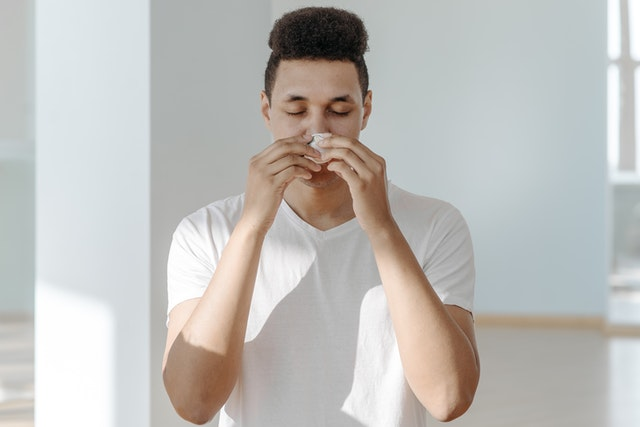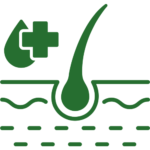What are allergies?
Allergies can be defined as an immune system response to foreign substances, such as mould, pollen, dust, smoke, etc. An allergic reaction to these substances may not be experienced by other people, which is why if you have allergies then you need to be careful of exposure.
When you have allergies, your body produces antibodies (proteins) to an allergen, which helps your immune system fight off the substance as a defence mechanism. Even if the allergen isn’t inherently harmful, your body produces these antibodies as an automatic response.
When you have a substance come into contact with your body, your antibodies can release chemicals such as histamine that can create an inflammatory response in the skin, sinuses, GI, etc. This can cause discomfort, and in severe cases an emergency situation in the form of an anaphylaxis.

What is the cause of an allergic reaction?
Any foreign substance can cause an allergic reaction, as single or multiple allergens may trigger an immune response. You could be allergic to –
Pet dander – This is a common allergen worldwide, with cat or dog hair being a trigger for many people.
Bee sting or insect bite – This can cause an allergic reaction in the form of swelling or bumps.
Nuts and other foods – Nut allergy is a common allergic reaction that has its own treatment protocol as several people have it.
Mould allergy – People may find it difficult to breath in a space with some form of mould. It is best to clean indoor spaces closely.
Dust mites – Dust can also play a significant role as an allergen for several people.
Pollen – Pollen can be a critical trigger for someone who may experience a severe reaction to it. It is best to avoid coming into contact with the allergen long-term.

What are the risk factors for allergies?
You may be more likely to develop allergies if you have the following risk factors –
Family history of allergies
Individuals with a family history of allergies can be more prone to specific allergens creating an immune response.
Age
Younger children may be more likely to develop allergic reactions to specific substances, more than adults.
Pre-existing allergic condition
Having asthma, eczema, or other conditions may make you more likely to acquire an allergic response to other particles.
Medication
Some medication may make it more likely to develop a reaction when exposed to an allergen. Food allergies can also be triggered when on medication to treat another condition.
Key symptoms of an allergic reaction
If you have allergies during a time of year or because of a certain trigger, then it is important to know the right symptoms to track over time. Some of them are listed below.
Sneezing – One of the most common allergy symptoms is sneezing. Depending on the types of allergies you have, such as hay fever or food allergy, you can experience continuous sneezing. It may feel like an illness that doesn’t go away even with over the counter medication.
Skin irritation/Itching – This is a key allergy symptom when you have a food allergy. This can also escalate to hives or red bumps all over the body, which can happen in the case of an insect allergy.
Swelling – Facial or body swelling is a critical allergic reaction to certain foods or foreign substances. You may also find it difficult to breath or communicate words when you have swelling.
Flaking of skin – Eczema or dermatitis can lead to flaking or peeling of the skin, which can be diagnosed as an allergic reaction. Treatment options must be planned out for individuals with skin flaking immediately.
Anaphylaxis – Your body can go into a state of shock, where you lose consciousness. You need an Epi pen to get you out of the state of shock and help your body ease its immune response.
How to test for allergies in the body
You can test your body for allergens using a range of testing mechanisms. They are designed to identify the immunoglobulin when exposed to specific types of potential allergens. They also help you determine if you have multiple allergies to help you manage your symptoms better.
Skin testing
Skin testing can be performed to test for an allergic reaction on the site location. This can be localized and tested for against a wide range of allergens, giving you highly accurate insights within a few days. When an allergy is found to a specific substance, you can form mitigation strategies.
Blood testing
Antibodies in the bloodstream can be tested for against dust, mites, cosmetics, animal protein, etc. to get a complete allergen profile of your body. You can use the results to consult with your doctor and create a management strategy to prevent immune system responses. It can help you understand what you are allergic to, which can help you manage the symptoms of allergic reactions.
Treatment options for allergies
There are many treatment strategies that you can opt for when it comes to allergies of different types. It is best to get tested for allergies, and consult with your doctor about the right way forward when it comes to treatment.
Medication
Depending on the type of allergy you have, your doctor may recommend antihistamines, decongestants, and allergy medication to treat symptoms. These can be significantly helpful in the case that you are predictably going to be exposed to irritants.
Nasal sprays
This is another great symptom management option, as nasal sprays or nasal steroids can be used to treat allergic reactions quickly. Corticosteroids are also designed to bring relief and to calm the immune system when it is in a heightened state.
Bronchodilators
Both oral and inhaled bronchodilators can be used to treat asthma and other allergic reaction conditions. Injectables may also be prescribed to ease symptoms and treat allergies within the body.
Immunotherapy
Immunotherapy or allergy oral immunotherapy can also be used in conjunction with corticosteroids to treat allergic reactions. They are ideally used to treat people with severe and chronic allergic reactions, and require years of treatment to help ease reaction severity.
Emergency epinephrine
In the case of emergencies, you may also be given an emergency epinephrine shot as a response to an anaphylaxis state. It is given during a life threatening state, as an emergency medication to an acute allergic reaction.
Depending on the type of allergies you may have, a specific type of medication may be provided. Treatment for hay fever, eczema, and food allergies are different, depending on the appropriate medicine prescribed. It is best to get a blood and skin test performed to gain better insights.
Management strategies for allergies
There are several management strategies to ensure that you don’t experience an allergic reaction to foreign substances.
Lowering exposure to allergen
The best strategy is to decrease the risk of an allergic reaction by avoiding the allergen. Whether it is food allergies or sensitivity to pollen, it is best to identify potential allergens early and set a workaround routine to avoid them.
Keeping medication close by
Having your medication near you at all times is the key to effective management. Since the allergic reaction can quickly escalate it is best to carry creams, injections, or orals with you as you commute to work or school. You should also carry an Epi pen in case you are susceptible to severe emergency reactions.
Saline nasal irrigation
Rinsing sinuses with salt and water solutions can help remove the mucus and irritants from the nose, especially during seasonal allergic reactions. It is also best to follow all instructions, and consult with your doctor before opting for it.
Improving air quality indoors
While you can manage your way through the outside world, it is equally important to control the quality of air indoor. Testing and eliminating dander, dust, mould, and other allergens within the home or work situation, can help manage your reaction significantly.
How to strengthen your immune system
The best strategy is to optimize your nutritional intake, improve sleep quality, and exercise to help boost your immune system. You should focus on key deficiencies you may have and develop a clear strategy to improve your vitamin and mineral levels long-term. Supplementation and diet changes can help significantly strengthen your immune system and response to particles.






































































